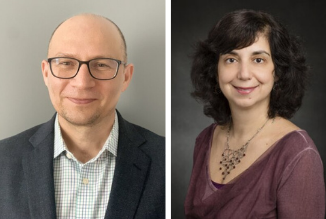Eugene M. Avrutin (Tobor Family Endowed Professor of Modern European Jewish History) and Valeria Sobol (Department Head and Professor, Slavic Languages & Literatures) are co-directors of the HRI Research Cluster “Russia and the Global Color Line.” They recently answered questions about their work and what it means to collaborate.
HRI Research Cluster funds support the efforts of scholars with shared interests to explore subjects or problems which they might lack the resources to do on their own. Applications are currently being accepted for 2022–23.
Tell us about your Research Cluster, “Russia and the Global Color Line.” Was this a new or an already existing collaboration?
The idea behind the cluster is to raise exploratory questions about the meanings and functions of racial identifications and categories in Russia from a global perspective. Our cluster studies the relationship between race, whiteness, and geography; how Russia fits into the global dimensions of the color line; and when and why skin color emerged as an important element in the complex process of identity formation. This is our first collaboration, and it’s been a wonderful and eye-opening experience for both of us.
How does being part of an HRI Research Cluster support your research?
Surprising as it may sound—given their centrality and significance for many other fields and subfields—race and racialization have only recently emerged as important questions of scholarly inquiry in Russian and East European Studies. Our cluster brings together an interdisciplinary group of scholars, from graduate students at various stages of their careers to professors. Our conversations have been wide-ranging, and we hope to continue for several years to come.
What does interdisciplinary collaboration in the humanities look like (through the lens of this project)? How do you engage collaboratively?
The cluster centers around different initiatives: from reading groups and hosting visiting speakers to organizing a training workshop that responds to the Department of Slavic Languages and Literatures commitment to addressing issues of race in the classroom and beyond, and a junior scholar workshop later this summer as part of the Summer Research Lab organized by the Russian, East European, and Eurasian Center (REEEC), which aims to provide feedback to the students on work they present. We are also considering publishing an article cluster or an edited volume based on the summer workshop.
Are there any upcoming initiatives for Russia and the Global Color Line that we can share?
We have several visitors this semester: Eileen Kane, Associate Professor of History and Director of the Global Islamic Studies Program at Connecticut College, is visiting us March 3; and Rossen Djagalov, Assistant Professor of Slavic Language and Literatures at NYU, is visiting us on March 29. We are planning a pedagogy workshop in April, as well as a junior scholars workshop in the summer. Most exciting of all, the research cluster will continue, funded in part by REEEC.
Why should other humanists at Illinois consider applying for HRI research cluster support?
This is an excellent opportunity to start a collaboration, to experiment with ideas, and to work with scholars at various stages of their careers. The research support also allows the cluster participants to apply for larger grants down the road.
Research Cluster Members: Robert Geraci, Research Associate Professor, University Library; Zsuzsa Gille, Professor of Sociology; Harriet Murav, Professor of Comparative and World Literature and Slavic Languages and Literatures; Peter Wright, Assistant Professor of Slavic Languages and Literatures; Justin Balcor, Ph.D. student, School of Music, Musicology; Jeanie Eagle, Graduate Student, Department of History; Felix Cowan, Ph.D. candidate, Department of History; LeiAnna Hamel, Ph.D. candidate, Department of Slavic Languages and Literatures; Daria Semenova, Ph.D. candidate, Department of Slavic Languages and Literatures; Brian Yang, Ph.D. student, Department of Slavic Languages and Literatures; Richard Tempest, Professor of Slavic Languages and Literatures; and Rachel Stauffer, Ph.D., Visiting Project Coordinator, REEEC and IGI.
